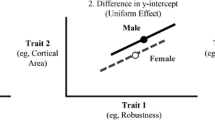Abstract
Gender difference in bone size is a potential confounder when comparing bone density between males and females. A comparison of volumetric BMD (vBMD) between men and women, which is a measure of bone mass relative to three-dimensional bone volume (g/cm3) as opposed to areal bone density (g/cm2), may be a more accurate reflection of gender differences in bone density. The aims of this study were to examine gender differences in bone mass (BMC), areal BMD (aBMD), volumetric BMD (vBMD) by comparing twins of opposite sex in whom the effects of age, genes and environment are partially controlled for. DEXA derived BMC, aBMD, vBMD at the third lumbar vertebra (L3), femoral neck (FN) and forearm (1/3 radius) were compared between 82 opposite sex pairs aged 18–80. BMC was significantly higher in males at all three sites (26–45.5%). For aBMD the gender differences remained significant at all sites except the spine. The average differences in aBMD were not as great as the differences in BMC (2.2–20.5%). The differences in vBMD, however, followed a different pattern. FN and L3 vBMD were significantly higher in females (4.8 and 0.6%, respectively), while radial BMD was not significantly different between the sexes. Comparing aBMD values between males and females, when females in general have a smaller skeleton than males may not be a true indication of gender differences in bone density. A comparison of vBMD between men and women shows only small differences in bone density between the sexes.

Similar content being viewed by others
References
Lips P (1997) Epidemiology and predictors of fractures associated with osteoporosis. Am J Med 103:3S–8S
Looker AC, Wahner HW, Dunn WL et al. (1995) Proximal femur bone mineral levels of US adults. Osteoporos Int 5:389–409
Berntsen GK, Fonnebo V, Tollan A et al. (2001) Forearm bone mineral density by age in 7,620 men and women: the Tromso study, a population-based study. Am J Epidemiol 153:465–473
Burger H, De LC, van Daile PL et al. (1998) Risk factors for increased bone loss in an elderly population: the Rotterdam Study. Am J Epidemiol 147:871–879
Dennison E, Eastell R, Fall CH et al. (1999) Determinants of bone loss in elderly men and women: a prospective population-based study. Osteoporos Int 10:384–391
Naganathan V, MacGregor AJ, Snider H et al. (2002) Gender differences in the genetic factors responsible for variation in bone density and ultrasound. J Bone Miner Res 17:725–733
Faulkner RA, McCulloch RG, Fyke SL et al. (1995) Comparison of areal and estimated volumetric bone mineral density values between older men and women. Osteoporos Int 5:271–275
Seeman E, Duan Y, Fong C et al. (2001) Fracture site-specific deficits in bone size and volumetric density in men with spine or hip fractures. J Bone Miner Res 16:120–127
Faulkner RA, McCulloch RG, Fyke SL et al. (1995) Comparison of areal and estimated volumetric bone mineral density values between older men and women. Osteoporos Int 5:271–275
Melton LJ, Khosla S, Achenbach SJ et al. (2000) Effects of body size and skeletal site on the estimated prevalence of osteoporosis in women and men. Osteoporos Int 11:977–983
Kelly PJ, Twomey L, Sambrook PN et al. (1990) Sex differences in peak adult bone mineral density. J Bone Miner Res 5:1169–1175
Karantanas AH, Kalef-Ezra JA, Glaros DC (1991) Quantitative computed tomography for bone mineral measurement: technical aspects, dosimetry, normal data and clinical applications. Br J Radiol 64:298–304
Gilsanz V, Boechat MI, Roe TF et al. (1994) Gender differences in vertebral body sizes in children and adolescents. Radiology 190:673–677
Gilsanz V, Boechat MI, Gilsanz R et al. (1994) Gender differences in vertebral sizes in adults: biomechanical implications. Radiology 190:678–682
Neu CM, Manz F, Rauch F et al. (2001) Bone densities and bone size at the distal radius in healthy children and adolescents: a study using peripheral quantitative computed tomography. Bone 28:227–232
Ebbesen EN, Thomsen JS, Beck-Nielsen H et al. (1999) Age- and gender-related differences in vertebral bone mass, density, and strength. J Bone Miner Res 14:1394–1403
Ebbesen EN, Thomsen JS, Mosekilde L (1997) Nondestructive determination of iliac crest cancellous bone strength by pQCT. Bone 21:535–540
Mosekilde L (1990) Sex differences in age-related changes in vertebral body size, density and biomechanical competence in normal individuals. Bone 11:67–73
Duan Y, Parfitt A, Seeman E (1999) Vertebral bone mass, size, and volumetric density in women with spinal fractures. J Bone Miner Res 14:1796–1802
Genant HK, Gluer CC, Lotz JC (1994) Gender differences in bone density, skeletal geometry, and fracture biomechanics. Radiology 190:636–640
Seeman E (1998) Growth in bone mass and size--are racial and gender differences in bone mineral density more apparent than real? J Clin Endocrinol Metab 83:1414–1419
Schreuder MF, van DA, Van LA et al. (1998) Volumetric measurements of bone mineral density of the lumbar spine: comparison of three geometrical approximations using dual-energy X-ray absorptiometry (DXA). Nucl Med Commun 19:727–733
Sabin MA, Blake GM, MacLaughlin-Black SM et al. (1995) The accuracy of volumetric bone density measurements in dual X-ray absorptiometry. Calcif Tissue Int 56:210–214
Griffiths MR, Noakes KA, Pocock NA (1997) Correcting the magnification error of fan beam densitometers. J Bone Miner Res 12:119–123
Tothill P, Hannan WJ, Wilkinson S (2001) Comparisons between a pencil beam and two fan beam dual energy X-ray absorptiometers used for measuring total bone and soft tissue. Br J Radiol 74:166–176
Author information
Authors and Affiliations
Corresponding author
Rights and permissions
About this article
Cite this article
Naganathan, V., Sambrook, P. Gender differences in volumetric bone density: a study of opposite-sex twins. Osteoporos Int 14, 564–569 (2003). https://doi.org/10.1007/s00198-003-1422-3
Received:
Accepted:
Published:
Issue Date:
DOI: https://doi.org/10.1007/s00198-003-1422-3




